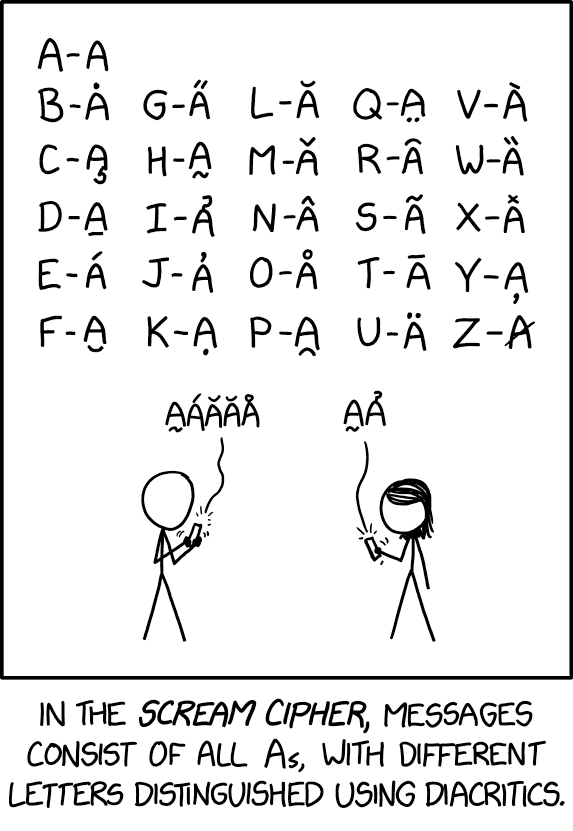Archive for Orthography
Names as verbs
In a comment on yesterday's post "A 12th-century influencer", Laura Morland wrote:
Thanks for sharing "to abelard," the new verb of the month! Note to AP: the grammarians will insist that it be spelled with a lower-case "a". (Verbs are never capitalized, not even in German, I don't believe.)
This is one where The Errorist might have the upper hand.
Read the rest of this entry »
De(semi)colonization
Babbel's April 2025 Semicolon Survey looked at students' reactions to the obvious secular decline in semicolon frequency:
The semicolon once stood as a symbol of thoughtful, elegant writing, a punctuation mark beloved by literary greats like Jane Austen and Virginia Woolf. But today, the humble semicolon faces an uncertain future.
New analysis from Babbel uncovers a stark decline: semicolon usage in British English books has fallen by nearly 50% in the past two decades. In fact, historical data shows this decline stretches back centuries. In 1781, British literature featured a semicolon roughly every 90 words; by 2000, it had fallen to one every 205 words. Today, there’s just one semicolon for every 390 words.
And it’s not just in books. New survey data from Babbel reveals over half (54%) of UK students didn’t know when to replace a comma with a semicolon.
Babbel partnered with the London Student Network, a community of 500,000 students, to ask about their attitudes toward the semicolon and whether they actually knew how to use it. The quiz, co-written by Babbel’s linguistic experts and grammarian Lisa McLendon, tested students on real-world semicolon usage.
-
- Based upon responses to the interactive quiz, 28% of young Britons don’t use the semicolon at all. 39% of students claim to rarely use semicolons; just 11% of respondents described themselves as frequent users of the semicolon.
- Over half (54%) of young Britons don’t know the rules around semicolon usage (4 of the 5 most poorly-answered questions required respondents to identify when to replace a comma with a semicolon). UK students scored 49% on average on the semicolon quiz.
- Although many don’t understand or use it, the Babbel survey revealed that 67% of young Britons still believe the semicolon has value.
Read the rest of this entry »
Buena
Following up on the issue of English spelling variation, this picture has been making the rounds on social media:
I thought of it when I was reminded that the New Jersey borough of Buena is pronounced /ˈbjuːnə/ — so that the first syllable is the same as the first syllable of beauty.
Read the rest of this entry »
Scream cipher
A recent xkcd:

Mouseover title: "AAAAAA A ÃA̧AȂA̦ ǍÅÂÃĀÁȂ AAAAAAA!"
Read the rest of this entry »
Yair
In an Australian novel, I recently encountered hundreds of cases where an informal assent is spelled in an unexpected way, e.g. "Yair, that’s true enough."
Read the rest of this entry »
Just in case
Variety told us a few days ago that Bad Bunny's new album made it to first place on the Billboard 200 — "Bad Bunny Beats Taylor Swift in Extremely Tight Race to No. 1 on Albums Chart". In other coverage, Pitchfork's review leads with the assertion that "Bad Bunny synthesizes the past and present sound of Puerto Rico for an anthemic, cross-generational album", and connects the music to the island's social and political history.
My focus this morning is on the album's non-standard capitalization ("DeBÍ TiRAR MáS FOToS" = " I should have taken more photos"). We can start with a difference in editorial choices: Pitchfork follows the album's use of upper and lower case letters in its title, while Variety standardizes the spelling (“Debí Tirar Más Fotos”). The English translation in either case is of course the same, "I should have taken more photos".
Read the rest of this entry »
Rebus of the week
[There's supposed to be an embedded skeet below, which is sometimes not coming through — so here's a screenshot:

]
Thought about responding to the and realized that I'd rather stick my tongue in a light socket so go me, I can learn.
— Elizabeth Bear (@matociquala.bsky.social) January 9, 2025 at 4:08 PM
Read the rest of this entry »
The cost of commas?
My 1/2/2025 post "American health care in 1754" quoted at length from Benjamin Franklin's account of the founding of Pennsylvania Hospital. The main point was the striking difference between then and now in the attitudes of (some) business leaders. But since this is Language Log rather than Health Care Politics Log, I suggested "the obvious stylistic change in sentence length" as a linguistic angle, with a link to the slides for my presentation at SHEL12 in 2022, "Historical trends in English sentence length and syntactic complexity". And Julian reponded in the comments: "Clearly commas were cheaper, in those days".
Read the rest of this entry »
Remaining problems with TTS
(…and with the New York Department of Environmental Conservation…)
Like many other online text sites, the New York Times now offers synthetic text-to-speech readings for (most of) its stories. TTS quality has improved enormously since the 1980s, when I worked with Bill Dunn from Dow Jones Information Services on (the idea of) a pre-internet version of digital news delivery, including synthesized audio versions. (See "Thanks, Bill Dunn!", 8/6/2009, for a bit more of the story.)
And this morning, while doing some brainless form checking, I listened to the audio version of Victor Mather and Jesus Jiménez, "After 7 Years, P’Nut the Squirrel Is Taken Away and Then Put Down", NYT 11/1/2024, which starts this way:
P’Nut, a pet squirrel with a popular Instagram page, was seized by state government officials on Wednesday in Pine City, N.Y., and later euthanized to test for rabies.
Read the rest of this entry »
